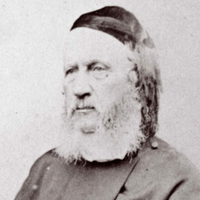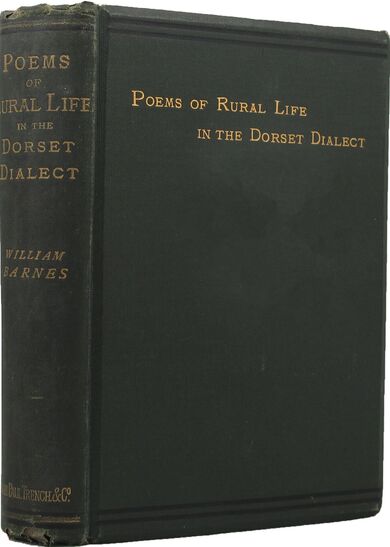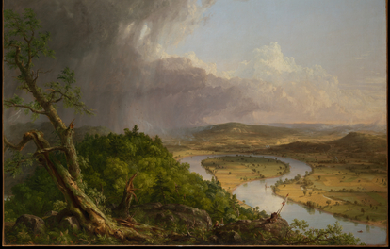THE TIMES.
John an’ Tom.
JOHN.
Well, Tom, how be’st? Zoo thou’st a-got thy neäme
Among the leaguers, then, as I’ve a heärd.
TOM.
Aye, John, I have, John; an’ I ben’t afeärd
To own it. Why, who woulden do the seäme?
We shant goo on lik’ this long, I can tell ye.
Bread is so high an’ wages be so low,
That, after workèn lik’ a hoss, you know,
A man can’t eärn enough to vill his belly.
JOHN.
Ah! well! Now there, d’ye know, if I wer sure
That theäsem men would gi’e me work to do
All drough the year, an’ always pay me mwore
Than I’m a-eärnèn now, I’d jein em too.
If I wer sure they’d bring down things so cheap,
That what mid buy a pound o’ mutton now
Would buy the hinder quarters, or the sheep,
Or what wull buy a pig would buy a cow:
In short, if they could meäke a shillèn goo
In market just so vur as two,
Why then, d’ye know, I’d be their man;
But, hang it! I don’t think they can.
TOM.
Why ees they can, though you don’t know’t,
An’ theäsem men can meäke it clear.
Why vu’st they’d zend up members ev’ry year
To Parli’ment, an’ ev’ry man would vote;
Vor if a fellow midden be a squier,
He mid be just so fit to vote, an’ goo
To meäke the laws at Lon’on, too,
As many that do hold their noses higher.
Why shoulden fellows meäke good laws an’ speeches
A-dressed in fusti’n cwoats an’ cord’roy breeches?
Or why should hooks an’ shovels, zives an’ axes,
Keep any man vrom votèn o’ the taxes?
An’ when the poor’ve a-got a sheäre
In meäkèn laws, they’ll teäke good ceäre
To meäke some good woones vor the poor.
Do stan’ by reason, John; because
The men that be to meäke the laws,
Will meäke em vor theirzelves, you mid be sure.
JOHN.
Ees, that they wull. The men that you mid trust
To help you, Tom, would help their own zelves vu’st.
TOM.
Aye, aye. But we would have a better plan
O’ votèn, than the woone we got. A man,
As things be now, d’ye know, can’t goo an’ vote
Ageän another man, but he must know’t.
We’ll have a box an’ balls, vor votèn men
To pop their hands 'ithin, d’ye know; an’ then,
If woone don’t happen vor to lik’ a man,
He’ll drop a little black ball vrom his han’,
An’ zend en hwome ageän. He woon’t be led
To choose a man to teäke away his bread.
JOHN.
But if a man you midden like to 'front,
Should chance to call upon ye, Tom, zome day,
An’ ax ye vor your vote, what could ye zay?
Why if you woulden answer, or should grunt
Or bark, he’d know you’d meän “I won’t.”
To promise woone a vote an’ not to gi’e’t,
Is but to be a liar an’ a cheat.
An’ then, bezides, when he did count the balls,
An’ vind white promises a-turn’d half black;
Why then he’d think the voters all a pack
O’ rogues together,—ev’ry woone o’m false.
An’ if he had the power, very soon
Perhaps he’d vall upon em, ev’ry woone.
The times be pinchèn me, so well as you,
But I can’t tell what ever they can do.
TOM.
Why meäke the farmers gi’e their leäbourèn men
Mwore wages,—half or twice so much ageän
As what they got.
JOHN.
But, Thomas, you can’t meäke
A man pay mwore away than he can teäke.
If you do meäke en gi’e, to till a vield,
So much ageän as what the groun’ do yield,
He’ll shut out farmèn—or he’ll be a goose—
An’ goo an’ put his money out to use.
Wages be low because the hands be plenty;
They mid be higher if the hands wer skenty.
Leäbour, the seäme’s the produce o’ the yield,
Do zell at market price—jist what 'till yield.
Thou wouldsten gi’e a zixpence, I do guess,
Vor zix fresh aggs, if zix did zell for less.
If theäsem vo’k could come an’ meäke mwore lands,
If they could teäke wold England in their hands
An’ stratch it out jist twice so big ageän,
They’d be a-doèn some’hat vor us then.
TOM.
But if they wer a-zent to Parli’ment
To meäke the laws, dost know, as I’ve a-zaid,
They’d knock the corn-laws on the head;
An’ then the landlards must let down their rent,
An’ we should very soon have cheaper bread:
Farmers would gi’e less money vor their lands.
JOHN.
Aye, zoo they mid, an’ prices mid be low’r
Vor what their land would yield; an’ zoo their hands
Would be jist where they wer avore.
An’ if theäse men wer all to hold together,
They coulden meäke new laws to change the weather!
They ben’t so mighty as to think o’ frightenèn
The vrost an’ raïn, the thunder an’ the lightenèn!
An’ as vor me, I don’t know what to think
O’ them there fine, big-talkèn, cunnèn,
Strange men, a-comèn down vrom Lon’on.
Why they don’t stint theirzelves, but eat an’ drink
The best at public-house where they do staÿ;
They don’t work gratis, they do get their paÿ.
They woulden pinch theirzelves to do us good,
Nor gi’e their money vor to buy us food.
D’ye think, if we should meet em in the street
Zome day in Lon’on, they would stand a treat?
TOM.
They be a-païd, because they be a-zent
By corn-law vo’k that be the poor man’s friends,
To tell us all how we mid gaïn our ends,
A-zendèn peäpers up to Parli’ment.
JOHN.
Ah! teäke ceäre how dost trust em. Dost thou know
The funny feäble o’ the pig an’ crow?
Woone time a crow begun to strut an’ hop
About some groun’ that men’d a-been a-drillèn
Wi’ barley or some wheat, in hopes o’ villèn
Wi’ good fresh corn his empty crop.
But lik’ a thief, he didden like the païns
O’ workèn hard to get en a vew graïns;
Zoo while the sleeky rogue wer there a-huntèn,
Wi’ little luck, vor corns that mid be vound
A-peckèn vor, he heärd a pig a-gruntèn
Just tother zide o’ hedge, in tother ground.
“Ah!” thought the cunnèn rogue, an’ gi’ed a hop,
“Ah! that’s the way vor me to vill my crop;
Aye, that’s the plan, if nothèn don’t defeät it.
If I can get thik pig to bring his snout
In here a bit an’ turn the barley out,
Why, hang it! I shall only have to eat it.”
Wi’ that he vled up straïght upon a woak,
An’ bowèn, lik’ a man at hustèns, spoke:
“My friend,” zaid he, "that’s poorish livèn vor ye
In thik there leäze. Why I be very zorry
To zee how they hard-hearted vo’k do sarve ye.
You can’t live there. Why! do they meän to starve ye?”
“Ees,” zaid the pig, a-gruntèn, "ees;
What wi’ the hosses an’ the geese,
There’s only docks an’ thissles here to chaw.
Instead o’ livèn well on good warm straw,
I got to grub out here, where I can’t pick
Enough to meäke me half an ounce o’ flick.”
“Well,” zaid the crow, "d’ye know, if you’ll stan’ that,
You mussen think, my friend, o’ gettèn fat.
D’ye want some better keep? Vor if you do,
Why, as a friend, I be a-come to tell ye,
That if you’ll come an’ jus’ get drough
Theäse gap up here, why you mid vill your belly.
Why, they’ve a-been a-drillèn corn, d’ye know,
In theäse here piece o’ groun’ below;
An’ if you’ll just put in your snout,
An’ run en up along a drill,
Why, hang it! you mid grub it out,
An’ eat, an’ eat your vill.
Their idden any fear that vo’k mid come,
Vor all the men be jist a-gone in hwome.”
The pig, believèn ev’ry single word
That wer a-twold en by the cunnèn bird
Wer only vor his good, an’ that 'twer true,
Just gi’ed a grunt, an’ bundled drough,
An’ het his nose, wi’ all his might an’ maïn,
Right up a drill, a-routèn up the graïn;
An’ as the cunnèn crow did gi’e a caw
A-praisèn 'n, oh! he did veel so proud!
An’ work’d, an’ blow’d, an’ toss’d, an’ ploughed
The while the cunnèn crow did vill his maw.
An’ after workèn till his bwones
Did eäche, he soon begun to veel
That he should never get a meal,
Unless he dined on dirt an’ stwones.
“Well,” zaid the crow, “why don’t ye eat?”
“Eat what, I wonder!” zaid the heäiry plougher.
A-brislèn up an’ lookèn rather zour;
“I don’t think dirt an’ flints be any treat.”
“Well,” zaid the crow, "why you be blind.
What! don’t ye zee how thick the corn do lie
Among the dirt? An’ don’t ye zee how I
Do pick up all that you do leäve behind?
I’m zorry that your bill should be so snubby.”
“No,” zaid the pig, “methinks that I do zee
My bill will do uncommon well vor thee,
Vor thine wull peck, an’ mine wull grubby.”
An’ just wi’ this a-zaid by mister Flick
To mister Crow, wold John the farmer’s man
Come up, a-zwingèn in his han’
A good long knotty stick,
An’ laid it on, wi’ all his might,
The poor pig’s vlitches, left an’ right;
While mister Crow, that talk’d so fine
O’ friendship, left the pig behine,
An’ vled away upon a distant tree,
Vor pigs can only grub, but crows can vlee.
TOM.
Aye, thik there teäle mid do vor childern’s books:
But you wull vind it hardish for ye
To frighten me, John, wi’ a storry
O’ silly pigs an’ cunnèn rooks.
If we be grubbèn pigs, why then, I s’pose,
The farmers an’ the girt woones be the crows.
JOHN.
’Tis very odd there idden any friend
To poor-vo’k hereabout, but men mus’ come
To do us good away from tother end
Ov England! Han’t we any frien’s near hwome?
I mus’ zay, Thomas, that ’tis rather odd
That strangers should become so very civil,—
That ouer vo’k be childern o’ the Devil,
An’ other vo’k be all the vo’k o’ God!
If we’ve a-got a friend at all,
Why who can tell—I’m sure thou cassen—
But that the squier, or the pa’son,
Mid be our friend, Tom, after all?
The times be hard, ’tis true! an’ they that got
His blessèns, shoulden let theirzelves vorget
How ’tis where the vo’k do never zet
A bit o’ meat within their rusty pot.
The man a-zittèn in his easy chair
To flesh, an’ vowl, an’ vish, should try to speäre
The poor theäse times, a little vrom his store;
An’ if he don’t, why sin is at his door.
TOM.
Ah! we won’t look to that; we’ll have our right,—
If not by feäir meäns, then we wull by might.
We’ll meäke times better vor us; we’ll be free
Ov other vo’k an’ others’ charity.
JOHN.
Ah! I do think you mid as well be quiet;
You’ll meäke things wo’se, i’-ma’-be, by a riot.
You’ll get into a mess, Tom, I’m afeärd;
You’ll goo vor wool, an’ then come hwome a-sheär’d.




